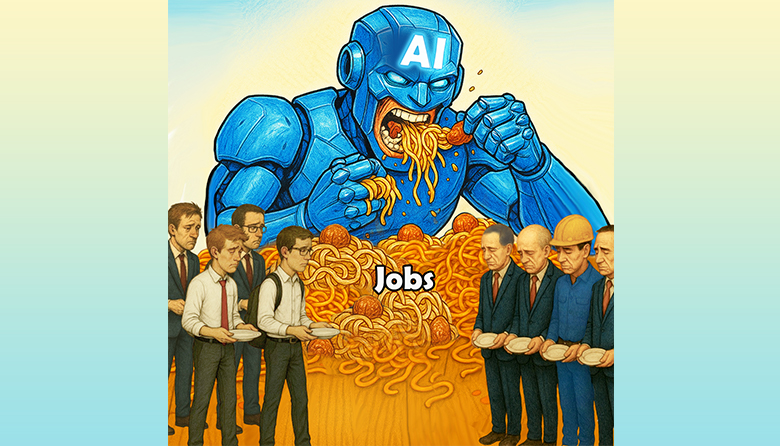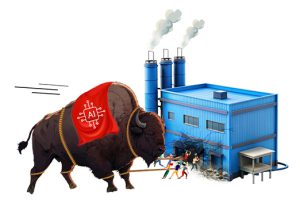AI Development is taking away both; jobs & human purpose
Disclaimer: This is not to paint a gloomy picture. The reason for writing this article is to offer a reality check.
Many like making feel-good statements like “AI will create more jobs” or “This therapy has no side effects,” which is as crazy as saying “digital photography will increase the demand for film rolls!”
Believing in fake ads like “this magical medicine cures all diseases” can mislead people into avoiding real treatments—with fatal consequences. AI and Job loss is not just a topic for debates—it’s a fast-approaching reality. While AI Development is fascinating and transformational, it comes at a high cost due to rapid & AI automation.
Can the rapid developments in AI create a scary future for mankind?
The answer is YES. Here’s the explanation.
The Industrial Revolution in 18th–19th century UK/Europe created some new jobs—like technicians, operators, and maintenance workers for machines. But the primary goal was to produce more with fewer human workers.
Now, let’s look at AI’s current initiatives and their impacts — clear signs of AI and Job loss through AI Development and AI automation:
- AI Chatbots & AI-based IVR bots = Loss of support jobs (already happening) AI Chatbots have quickly become a replacement for customer support positions, processing questions and issues on their own without human involvement. With capabilities expanding, AI Chatbots and AI engines will be replacing even more old school support positions in industries, providing faster and more effective service.
- Driverless cars (Self-driving Car) The name says it all = Meant to eliminate driving jobs
AI-based translation = Threat to translators and translation agencies - Copywriting and Content creation – A great number of jobs were lost within months of ChatGPT launch.
- Automated cooking, image generation without graphic artists, programmer-free software development — the list goes on
Do we see AI creating owner-less corporations or politician-free governments?
The driving forces behind AI automation are those in power, seeking more control and further consolidating wealth — increasing the divide between the “haves” and “have-nots.” Capitalism thrives on maximizing control, minimizing spending and risks.
This imbalance may trigger economic migration, political unrest, and even humanitarian crises — adding to the global impact of AI and Job loss.
So, here’s the clear statement:
AI will cause massive job loss, significant societal disruption, and a profound impact on the economy, power structures, and human psychology.
In the recently published report, experts predict that AI will replace full-time careers in 2025. The Future of Jobs Global Report 2025 reveals that 41% of companies plan workforce reductions as AI automation expands, sparking widespread unease among employees worldwide.
AI-Powered Programming: Silent threat to Coders –
AI Development in programming software such as GitHub Copilot, ChatGPT, and DeepSeek are being sold as copilots for coders—but quietly, they’re becoming pilots. These programs can now create complete functions, debug code, optimize queries, and even write complete modules with little human intervention. While this increases productivity in the short term, it’s also decreasing the demand for junior developers and entry-level programmers. What used to require a team of five can now be accomplished by a single talented developer using an AI tool. The consequence? Less room for new talent, shrinking growth opportunities, and increasing fear of redundancy even among talented programmers. AI and Job loss is no longer a future issue — it’s a pressing challenge of the present. What was seen as a Science Fiction a few years ago, is seen as reality today.
The Dangers of Agentic AI: Where tools take over as decision-makers
We are moving into the age of Agentic AI — where systems no longer just aid but act independently. Agentic AIs can make decisions, determine goals, and execute tasks by themselves. Although this increases efficiency, it also poses a critical threat: what if machines begin replacing not only jobs, but human judgment as well?
This transition may drive individuals further out of the loop -not only economically, but socially and psychologically. If machines no longer require users, what becomes of the value of human agency?
No human angle in Corporate AI Adoption
Businesses are racing to implement AI automation for profits, not people. There’s no planning for managing the change of roles and displacement. There are no ethical standards or plans for phased replacement, transition, or mental health care. This creates financial and social burden on employees/ workers — adding to AI and Job loss.
A psychologist was explaining in a session – the reasons for overall dissatisfaction in society, and also the increased number of divorces/ unstable relationships etc. He said, “The new generation spends a lot of time with devices. Devices behave as you expect them to behave. Each time when you press a button the response is known. But the real-life human relations do not behave this way. Use of devices, has reduced the threshold of acceptance, causing the relations to become weaker. This was just about use of devices like tabs and mobiles. Now with the advent of AI, the problem with human relationships is likely to get far worse!
The Global Disparity in AI Adoption
AI Development doesn’t affect every country the same way. Developed nations often have better support systems, faster adoption, and structured reskilling programs. But in developing countries, it can lead to widespread job loss with limited fallback options.
For example, India’s IT sector mainly provides services rather than building products. If these service-based roles become redundant due to AI automation, it could lead to large-scale unemployment in a country already facing population pressure.
AI & Collapse of Social Equilibrium
We often talk about AI and Job loss. But the bigger problem is more serious — deeper than just losing jobs. AI automation isn’t just taking away employment—it’s taking away purpose. Just imagine, one fine day you realize that your skills/ services are of no use. You are suddenly rendered useless! And when this happens to millions who are no longer needed in the system, the impact won’t just be financial. It’ll be deeply psychological.
Governments will be forced to respond with universal basic income or social security schemes. Because they can’t let displaced people starve.
But let’s ask the harder question: What happens to a society where people don’t feel useful anymore?
People don’t just live on money. They live on meaning. And when meaning disappears, mind starts losing control and negativity gives rise to following issues.
• Frustration
• Depression
• Crime
• Perversion
• Ideological extremism
• Social unrest
The gap between the empowered and the common will widen at a pace we’ve never imagined. And that kind of extreme inequality doesn’t just fracture economies—it collapses the society.
Loss of Interpersonal Value
As more human interaction is taken over by AI automation—be it customer support, therapy, or education—the worth of human-to-human interaction disintegrates. Individuals start to feel less needed, less heard, less connected.
This feeling of less valued, economical rift and other things as mentioned above may lead to total collapse of the society.
Social Collapse: A giant star starts pulling everything in due to its gravity and going further. It gets bigger, denser, hungrier—until one day, it collapses into itself.
A black hole.
That’s what happens when imbalance goes unchecked. That’s what we risk when human purpose is lost due to uncontrolled AI automation.




